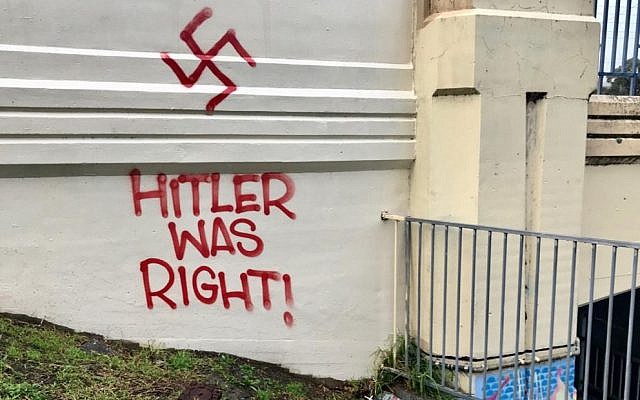Defeating the scourge of Jew-hatred
'We must not only remember the six million Jews who perished in the Shoah, but to ensure we speak out and act against the evil of antisemitism'.
NEXT week, January 27, the international community, including in Australia, will come together to observe International Holocaust Remembrance Day, this year marking the 75th anniversary of the liberation of the Nazi death camp Auschwitz-Birkenau.
The Holocaust was a singularly monstrous act of evil, that imposes upon all of us, not only a duty to remember, but an obligation to learn from it.
The great Spanish philosopher George Santayana famously said: “Those who cannot remember the past are condemned to repeat it.”
Yet today, 75 years after the Holocaust, the darkest chapter in human history, it would appear that, as a society, we have failed to grasp these lessons.
In France for example, the Jewish community makes up merely one per cent of the population, yet 50 per cent of all race-based attacks are against Jews.
Last year, the United Kingdom recorded its highest-ever number of antisemitic incidents.
In Germany of all places, violence targeting Jews rose by 71.4 per cent in 2018. Only this past Yom Kippur, a terrorist attacked a synagogue in Halle and the country’s Antisemitism Commissioner said, “I cannot advise Jews to wear the kippah everywhere all the time in Germany.”
This was not 1939, but rather 2019.
Even in the United States, Synagogues are being attacked and in parts of New York, it is seemingly no longer safe to openly identify as Jewish, for fear of violence.
Australia, however, long considered an oasis for the Jewish community, and home to the highest number of Holocaust survivors per capita outside Israel, is not immune either.
According to a recent report of the Executive Council of Australian Jewry, in the year ending September 2019, there was a 30 per cent rise in serious antisemitic incidents across the country.
In particular, it was jarring to note that of the 114 incidents of antisemitic “abuse, harassment and intimidation”, 70 cases (or 61 per cent) were in New South Wales alone.
Only last week, one of the leading news stories in Australia was from a small country town in Victoria, were residents were proudly flying the swastika.
Meanwhile, across other parts of the country, graffiti, vandalism and online harassment of Jews are all on the rise.
That individuals can feel impunity to carry out such attacks on members of our community is abhorrent and ought to serve as a clarion call to action.
The question however is what steps can, or ought to, be taken?
Firstly, there must be a recognition that today’s antisemitism comes from a toxic union of far right, far left and elements of the Muslim community. And whereas antisemitism traditionally targeted the Jew as an individual, today it also singles out and delegitimises the State of Israel, as the Jew among the nations, perhaps evident no more so than in the insidious BDS movement and the actions of state players like Iran and Malaysia.
We must therefore “call a spade a spade” and condemn antisemitism in whatever manner, shape or form it is expressed.
We also need to recognise that no one is born an antisemite, but hatred develops through indoctrination, ignorance or misinformation.
Therefore the study of modern antisemitism, including the Holocaust, ought to be compulsory in schools.
In today’s digital age, social media has also enabled a modern Jew-hatred on steroids.
Greater steps need to be taken to stamp out online antisemitism and incitement, including working closer with the tech giants and service providers.
The Holocaust did not start at Auschwitz. That’s where it ended for six million of our people. Rather, it began with the singling out and dehumanisation of an entire group of people, based on our faith, religion and identity.
And while antisemitism may target Jews, it cannot be left solely to the Jewish community to fight. This scourge of Jew hatred can only be defeated when we, as a community together, stand up, call it out and take action.
As Australians, we are deeply fortunate that the fight against antisemitism transcends politics and is a bipartisan commitment shared by both major parties, with Prime Minister Scott Morrison unequivocally reiterating that “Antisemitism has no place in this country.”
Last year also, Australia became a full member of the International Holocaust Remembrance Alliance (IHRA), the peak international body committed to strengthening, advancing and promoting Holocaust education and remembrance, as well as combating global antisemitism.
However, more, much more, can still be done to help eradicate this oldest of hatreds.
Jews, like all members of society, must be able to live and practise our faith freely, without fear of intimidation or violence. At the same time, nor should we cower to fear, for that would be providing victory to those who wish to instil hate and sow division.
Rather, we must walk with our heads held high as proud Jews, Zionists and Australians.
As we approach the International Holocaust Remembrance Day and the 75th anniversary of the liberation of Auschwitz-Birkenau, we must not only remember the six million Jews who perished in the Shoah, but to ensure we speak out and act against the evil of antisemitism, to ensure this darkest of chapters in human history truly never repeats.
Arsen Ostrovsky is the Israel Affairs Director of the Zionist Council of New South Wales (ZCNSW).


comments